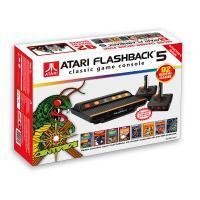Bill Loguidice's Blog, page 128
July 30, 2014
Official Game List for Atari Flashback 5 Classic Game Console
 AtGames has authorized the exclusive release of the game list for the 2014 edition of the Atari Flashback 5, which hits major US retailers like Toys''R''Us in October.
AtGames has authorized the exclusive release of the game list for the 2014 edition of the Atari Flashback 5, which hits major US retailers like Toys''R''Us in October.
The 92 game list that appears on the Atari Flashback 5 is as follows:
(Read more)
Official Game List for Intellivision Flashback Classic Game Console
 AtGames has authorized the exclusive release of the game list for the 2014 edition of the Intellivision Flashback, which hits major US retailers like Toys''R''Us, Dollar General, and Sam's Club in October.
AtGames has authorized the exclusive release of the game list for the 2014 edition of the Intellivision Flashback, which hits major US retailers like Toys''R''Us, Dollar General, and Sam's Club in October.
The 60 game list that appears on the Intellivision Flashback is as follows:
(Read more)
Official Game Lists for Sega Genesis Classic Game Console and Sega Genesis Ultimate Portable Game Player
 AtGames has authorized the exclusive release of the game lists for the 2014 editions of the Sega Genesis Classic Game Console (which accepts cartridges) and Sega Genesis Ultimate Portable Game Player (which accepts an SD card), each of which hits major US retailers like Toys''R''Us in October.
AtGames has authorized the exclusive release of the game lists for the 2014 editions of the Sega Genesis Classic Game Console (which accepts cartridges) and Sega Genesis Ultimate Portable Game Player (which accepts an SD card), each of which hits major US retailers like Toys''R''Us in October.
The 80 game list that appears on both the Sega Genesis Classic Game Console and Sega Genesis Ultimate Portable Game Player is as follows:
(Read more)
July 20, 2014
Gravitas Ventures acquires worldwide distribution rights to acclaimed videogame documentary, Gameplay
 Gravitas Ventures has acquired the worldwide distribution rights to our documentary film, Gameplay: The Story of the Videogame Revolution. Gravitas specializes in the aggregation of entertainment content by connecting independent filmmakers, producers, and distribution companies with leading cable, satellite, telco, and online distribution partners. In the last five years, Gravitas has released more than 2,000 films on Video on Demand (VOD). Through its relationships with studios and VOD operators, Gravitas can distribute a film into over 100 million North American and one billion worldwide homes. At present, Gravitas is working with the creators of Gameplay to translate the film into more than half a dozen additional languages. Additional details to follow.
Gravitas Ventures has acquired the worldwide distribution rights to our documentary film, Gameplay: The Story of the Videogame Revolution. Gravitas specializes in the aggregation of entertainment content by connecting independent filmmakers, producers, and distribution companies with leading cable, satellite, telco, and online distribution partners. In the last five years, Gravitas has released more than 2,000 films on Video on Demand (VOD). Through its relationships with studios and VOD operators, Gravitas can distribute a film into over 100 million North American and one billion worldwide homes. At present, Gravitas is working with the creators of Gameplay to translate the film into more than half a dozen additional languages. Additional details to follow.
July 7, 2014
The Retro League » Episode 240 – Extraordinary Games Require Extraordinary Evidence
 Our friends over at The Retro League have posted their latest podcast episode, 240, entitled, "Extraordinary Games Require Extraordinary Evidence." They cover their usual breadth of topics on the show and even took time to comment on a brief editorial I posted, "Is the retrogaming community too entitled?." Check out the episode here.
Our friends over at The Retro League have posted their latest podcast episode, 240, entitled, "Extraordinary Games Require Extraordinary Evidence." They cover their usual breadth of topics on the show and even took time to comment on a brief editorial I posted, "Is the retrogaming community too entitled?." Check out the episode here.
June 24, 2014
Is the retrogaming community too entitled?
 After spending quite a bit of time recently on various discussion forums on AtariAge and Facebook, it has really struck me more than usual how incredibly demanding our retrogaming community (and gaming community at large) is, and how entitled, as the title of this blog post states, some people come off as. This is of course nothing new, going back to the days in the late 1990s when MAME developers would get criticized or even threatened when someone's favorite game wasn't properly emulated, as if the monumental task of emulating what is now thousands of arcade machines, for free, wasn't stressful enough, or otherwise rewarding for the end user. It was the one game that was the deal breaker among the countless other games and the incredible accomplishment in and of itself.
After spending quite a bit of time recently on various discussion forums on AtariAge and Facebook, it has really struck me more than usual how incredibly demanding our retrogaming community (and gaming community at large) is, and how entitled, as the title of this blog post states, some people come off as. This is of course nothing new, going back to the days in the late 1990s when MAME developers would get criticized or even threatened when someone's favorite game wasn't properly emulated, as if the monumental task of emulating what is now thousands of arcade machines, for free, wasn't stressful enough, or otherwise rewarding for the end user. It was the one game that was the deal breaker among the countless other games and the incredible accomplishment in and of itself.
Of course, this kind of criticism has continued since. In my reviews over the past few years of the Atari Flashbacks 3 and 4, Sega Classic Console, and other similar devices, the negativity around those releases from viewers was often frequent and loud. Whether it wasn't getting the sound quite right in the Sega stuff, or missing a personal favorite game in the Atari stuff, the vitriol flew fast and furious. This included statements like, "No game x? It's a fail," or "The sound isn't quite right so I couldn't possibly use it." That's fine - individually we can dislike things for any reason we so choose - but then going on to state that people are idiots for buying it, or why would anyone want it, etc., and then going on what seems like a personal crusade to criticize said device at every possible opportunity (and, as we know, the Internet provides lots of opportunities) shows a remarkable lack of perspective. Take the examples in this paragraph. You're talking devices with say, 80 built-in games and original style controllers that typically retail for just $40. Can't we consider that maybe it might be OK to accept a few trade offs for something so low cost that offers relatively so much? Not for some, because apparently that one missing game is a personal affront or that tinny sound makes it completely worthless. [Read more]
May 30, 2014
My Xbox One now available in ebook and paperback formats!
 My Xbox One (2014)We're happy to announce that our latest book, My Xbox One, published by Que, is now available. You can check out the book, including sample content (which includes the front matter, Prologue, Chapter 3, and the index!), by going to the Pearson/Que Website (here). They have both the ebook and paperback versions available, as well as special bundle pricing. Of course, both formats are also available at booksellers everywhere, including Amazon, though it may be a few more days before the paperback shows as in stock (be sure to use the Look Inside and send a sample to Kindle features on there as well). As for the book, think of it like the missing manual for the Xbox One, providing visual, step-by-step guidance and tips for getting the most out of Microsoft's latest and greatest game console and media/entertainment center powerhouse. Let us know what you think, help spread the word, and, as always, thank you for the support!
My Xbox One (2014)We're happy to announce that our latest book, My Xbox One, published by Que, is now available. You can check out the book, including sample content (which includes the front matter, Prologue, Chapter 3, and the index!), by going to the Pearson/Que Website (here). They have both the ebook and paperback versions available, as well as special bundle pricing. Of course, both formats are also available at booksellers everywhere, including Amazon, though it may be a few more days before the paperback shows as in stock (be sure to use the Look Inside and send a sample to Kindle features on there as well). As for the book, think of it like the missing manual for the Xbox One, providing visual, step-by-step guidance and tips for getting the most out of Microsoft's latest and greatest game console and media/entertainment center powerhouse. Let us know what you think, help spread the word, and, as always, thank you for the support!
May 27, 2014
Just say No to kids react to old computers
 I hate that the latest "kids react to old computers" video (this time centered around the Apple II) is making the rounds everywhere. Besides the fact that this same click-bait gimmick has been done multiple times before with other computers, it proves nothing. You can put just about anyone of any age in front of just about any old computer and they likely won't know what to do with it beyond possibly knowing how to insert removable media and then stumbling around for the rest. Every computer back then had its own set of commands and own way of working beyond the basics. Even someone who is highly skilled in one or another brand of vintage computer won't necessarily have a clue how to work with a completely different brand of vintage computer. I've certainly experienced this phenomena myself, especially since I work with dozens of different vintage computers each year (Pro Tip: Keeping command "cheat sheets" handy is a big help!).
I hate that the latest "kids react to old computers" video (this time centered around the Apple II) is making the rounds everywhere. Besides the fact that this same click-bait gimmick has been done multiple times before with other computers, it proves nothing. You can put just about anyone of any age in front of just about any old computer and they likely won't know what to do with it beyond possibly knowing how to insert removable media and then stumbling around for the rest. Every computer back then had its own set of commands and own way of working beyond the basics. Even someone who is highly skilled in one or another brand of vintage computer won't necessarily have a clue how to work with a completely different brand of vintage computer. I've certainly experienced this phenomena myself, especially since I work with dozens of different vintage computers each year (Pro Tip: Keeping command "cheat sheets" handy is a big help!).
And no, today's computers and mobile devices haven't made anyone "stupid" or "lazy." Today's computers and mobile devices - as you would hope from almost 40 years of evolution in the home - are merely more user friendly. Personal computers back then always strived for that as well, but there were obvious limits given the technology. [Read more]
May 20, 2014
More details for Gameplay documentary screening at the NW Pinball and Arcade Show in Tacoma, WA, Saturday, June 7, 2014
As both a reminder and confirmation of the final details, the first special advance screening of our documentary film, Gameplay: The Story of the Videogame Revolution, at The Northwest Pinball and Arcade Show, will be on Saturday, June 7, 2014, from 8 - 10 PM in Seminar Room 316, and will be hosted by our talented director, Richard Goldgeweicht, who will take part in a question and answer session following the showing. We look forward to the response for our first public screening of the feature film. We'll also continue to keep everyone updated as further screening and broadcast dates are revealed in the coming months. Be sure to help us spread the word and thanks as always for the fantastic support and enthusiasm around this project!
May 16, 2014
Why did the Commodore 64 succeed where the Atari 8-bit didn't?

 After seeing yet another topic on AtariAge about why the Commodore 64 (C-64), released in 1982, succeeded in both sales and software support, where the Atari 8-bit series, released in 1979, didn't, I thought I'd offer up my usual thoughts on the matter in a more formal manner. To my mind, it's pretty simple. While the Atari 8-bits had a roughly three year headstart, in those three years, Atari wasn't able to make much headway in the market despite having the best audio-visual potential of the time, bar-none. The missteps with the lovely, but initially flawed, Atari 1200XL, didn't do them any favors, and by the time the C-64 started picking up significant momentum in 1983 when its retail price started dropping to the point where no one was able to compete effectively with its value proposition and still turn a profit, Atari was already done, particularly since they lacked Commodore's supply chain advantages.
After seeing yet another topic on AtariAge about why the Commodore 64 (C-64), released in 1982, succeeded in both sales and software support, where the Atari 8-bit series, released in 1979, didn't, I thought I'd offer up my usual thoughts on the matter in a more formal manner. To my mind, it's pretty simple. While the Atari 8-bits had a roughly three year headstart, in those three years, Atari wasn't able to make much headway in the market despite having the best audio-visual potential of the time, bar-none. The missteps with the lovely, but initially flawed, Atari 1200XL, didn't do them any favors, and by the time the C-64 started picking up significant momentum in 1983 when its retail price started dropping to the point where no one was able to compete effectively with its value proposition and still turn a profit, Atari was already done, particularly since they lacked Commodore's supply chain advantages.
Certainly price was a factor in the C-64's success in the US, but in the rest of the world, particularly Europe, price was often the primary driver (e.g., long after the US standardized on reliable, but expensive disks and drives, Europeans were still using unreliable, but cheap cassettes and tape decks), making Atari's inability to produce a low cost 8-bit in a timely manner particularly devastating. The influx of talented European programmers to the C-64's software pool can't be underestimated as the Atari 8-bit line struggled to make it into homes there. It also didn't do Atari any favors that they had multiple models out in the wild with 16K - 64K of memory at that time, making it difficult to target the higher spec. We can't underestimate the value of every Commodore 64 having 64K from its first day on the market to its last, making ports to platforms without a significant user base of guaranteed 64K-spec machines less likely. [Read more]



